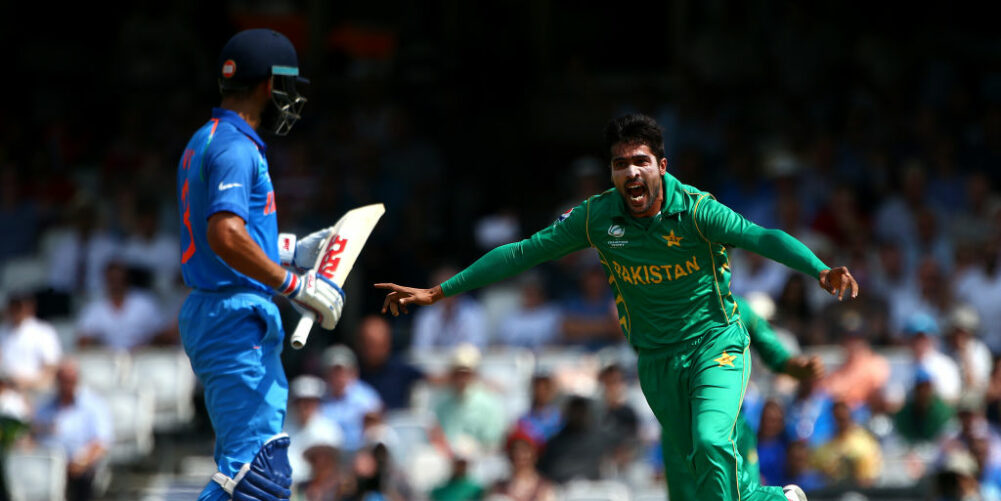Most cricket supporters, save for those of two countries, probably see the Ashes as the dominant force in the game. Well, they’d be wrong, at least in terms of sheer passion and numbers.
If you took every person interested in the outcome of an
Ashes match who has ever lived, all the way back to the first one in 1882, it
would still not exceed the hundreds of millions captivated on any given day
when India play Pakistan – as they will this Sunday in Manchester.
Begrudging neighbours, this is a titanic meeting whatever
the circumstance, though one much rarer than it used to be due to political
differences and the increasingly ding-dong rhetoric over the disputed territory
of Kashmir.
In fact, it was another recent skirmish on that border which
saw India threaten to withdraw from Sunday’s match with their government’s
backing, though that threat seems to have dissipated for the moment.
Although cricket is the pre-eminent sport of both countries,
the pair’s rivalry goes beyond that to the ideological, which may explain the
zealous nature of the support. Although simmering ever since British India was
split into two in 1947, the so-called Partition, it has new points of reference
for its grievances, such as India’s tremendous wealth from cricket as compared
to Pakistan’s relative penury.
The former means that India, citing force majeure, have not
fulfilled the ICC’s Future Tours Agreement for the past 12 years, at least not
when it comes to Pakistan. Only Pakistan has suffered, though, the loss of
revenues in TV rights alone costing them U$100m. Perhaps more pertinently, who
knows what will happen to the newly-minted Test Championship if India, backed
by the Indian government, continues this hardline stance.
Whatever the nub of the dispute, and it does change, it
stirs emotions as do World Cups, which only occur every four years. So far,
there has never been an India v Pakistan final but if there was it would spark
an interest in cricket as never before. Don’t believe me, well, I’m told that
this year’s World Cup final could have been sold five times over, given the
number of applications. Yet that pales compared to the India v Pakistan match.
With just under one million requests for tickets that could have been sold 30
times over.
The pair have met at Old Trafford before, in the 1999 World
Cup. Indeed, there have been six meetings between them since the tournament’s
inception in 1975, all of them won by India. Given that Pakistan, with 73 wins,
lead the head to head between them over 131 ODIs (India have won 54), it
suggests that either India find another gear for the big stage or Pakistan lose
their nerve, or maybe both.
I covered one of their previous meetings, the semi-final of
the 2011 World Cup, and can vouch for the strange and unique atmosphere that
surrounds it. That match was in Mohali, northern India, about 80 miles from
Pakistan. Despite the proximity, only a controlled amount of Pakistan fans were
allowed to cross the border near Amritsar. From there, and under strict
supervision, they were allowed to travel by bus and train to Mohali for the
match.
The caution, caused in part by the Mumbai terror attack
three years previously, did not stop there. A mile exclusion zone was placed
around the stadium into which, on match day, only the team buses and police
vehicles could enter.
By then India and Pakistan had not played each other
bilaterally for four years so the atmosphere surrounding the game, which was
frenzied despite the massive police and army presence, was strange even for
them. As such, unforced errors abounded with Pakistan somehow dropping six
catches.
The strangest incident, though, in a match India won
comfortably, was when Sachin Tendulkar was given out lbw to Saeed Ajmal by umpire
Ian Gould.
The moment came in the 11th over when Tendulkar was 23 (he
went on to make 85). Live, and on immediate TV replays, the batsman looked dead
for all money. But once the graphics and ball-tracking had been applied, the
ball was shown to be missing leg-stump. Gould, an experienced umpire and player
back in the day, just shook his head in disbelief at what had been shown.
Mostly their World Cup meetings have been on neutral ground though there was a
certain quarter-final in Bangalore during the 1996 World Cup, where Pakistan’s
defeat brought national uproar. Effigies of Pakistan’s players were burnt back
home while Wasim Akram, who as Pakistan’s captain had withdrawn from the match
with injury, had both his life and property threatened.
Pakistan’s first encounter with India in a World Cup wasn’t
until 1992, the one in Australia that they won after beating England in the
final. Despite overall victory, they lost their round robin match to India at
the Sydney Cricket Ground.
In a low-scoring match tempers frayed and there is a famous
photo of Javed Miandad jumping up and down taking the mickey out of Kiran More,
India’s wicketkeeper, for excessive appealing. More had the last laugh after
Pakistan’s batting fell away to lose the game by 43 runs.
In more recent times players have sought to prevent any inflammation during such matches with India captain Virat Kohli describing a recent match against Pakistan in the Asia Cup as “just another game”. But these are just words and virtually powerless when the juices of such a passionate rivalry begin to flow and national pride, a concept overplayed by most teams, really is at stake.
For rarity, intensity and potential combustibility, if not necessarily closeness of result, Manchester awaits.
DEREK PRINGLE / Photo: Getty Images












